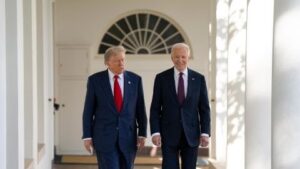
Bitcoin Tops Record $80,000 as Trump Nears Sweep of US Congress: What Does This Mean for the Future?
In an unexpected convergence of politics and finance, Bitcoin has surged past $80,000 amid political turmoil in the United States. With former President Donald Trump making strides toward a legislative sweep in Congress, the surge in Bitcoin’s value is igniting debates across the financial and political landscapes. As America faces a potential shift back toward Trump’s influence, the implications for the economy—and particularly for cryptocurrencies—could be massive.
Is the recent Bitcoin boom just a reflection of market enthusiasm, or does it signal deeper fears about America’s financial future?
The Politics of Bitcoin: Why Investors Are Turning to Crypto Amid Political Turbulence
Bitcoin’s meteoric rise comes at a moment when political and economic uncertainty in the United States is high. Trump’s growing influence over Congress has raised questions about the direction of U.S. economic policy, sparking anxieties about inflation, trade tensions, and federal spending. Under the previous Trump administration, unpredictable policies sent ripples through markets. Now, with the potential for a return of “Trumpian” politics, it appears many investors are seeking alternative stores of value.
Bitcoin, with its decentralized nature and independence from traditional banks, has emerged as a preferred hedge against such instability. In an environment where government fiscal policies may become less predictable, the appeal of cryptocurrencies—especially Bitcoin—is clear. Its value doesn’t hinge on the dollar’s stability, making it a go-to asset for those worried about inflation and potential economic slowdowns.
Could Trump’s Policies be a Double-Edged Sword for Bitcoin?
Interestingly, while Trump himself has voiced criticisms of Bitcoin in the past—going so far as to call it a “scam” and a potential threat to the dollar—his fiscal policies have inadvertently bolstered the asset. Many of Trump’s tax cuts, deregulation, and aggressive deficit spending during his first term were widely viewed as contributing factors to Bitcoin’s rise in 2020 and 2021. If Trump regains control over Congress, similar policies could reappear, indirectly fueling Bitcoin’s continued growth.
But the potential reimplementation of Trump’s economic approach isn’t without risks for Bitcoin and the broader crypto market. The previous administration’s hostility toward cryptocurrency included crackdowns on certain crypto activities and suggestions for tighter regulations on digital assets. If Trump’s Congress attempts to rein in the crypto market, the same government that sparked Bitcoin’s appeal could ultimately stifle its growth.
A Turning Point for Bitcoin as Institutional Interest Grows
As Bitcoin breaks the $80,000 barrier, many institutional investors are sitting up and taking notice. Bitcoin is no longer viewed solely as a volatile plaything for retail investors. Major financial institutions, hedge funds, and even some traditional banks are increasingly integrating Bitcoin into their portfolios and services. This shift signifies that Bitcoin is entering a new phase in the financial world, transforming from a speculative asset into a legitimate financial instrument.
However, institutional interest could also expose Bitcoin to increased regulatory scrutiny. In a scenario where Trump’s policies prioritize “America First” values, stricter regulations on financial markets—including cryptocurrencies—could loom large. If lawmakers decide that Bitcoin poses a risk to the dollar’s dominance, Bitcoin’s path may be met with headwinds.
What a Trump Congress Could Mean for Crypto Regulations
The cryptocurrency industry remains in a largely regulatory gray area, with lawmakers grappling over how to treat Bitcoin and other digital assets. Trump has hinted at toughening up on cryptocurrency regulation, aiming to keep the U.S. dollar as the dominant global currency. His potential sway over Congress could embolden him to push legislation that might restrict the use of cryptocurrencies, particularly as they become more popular in retail and institutional settings.
On the other hand, the same anti-establishment fervor that fuels Bitcoin’s appeal also resonates with Trump’s base. Many of Trump’s supporters favor deregulation, and a Congressional Trump sweep might lead to hands-off policies that give crypto companies more breathing room. This scenario would further legitimize Bitcoin in the U.S. economy, particularly if Trump positions Bitcoin as a counterbalance to more traditional, centralized financial systems.
Global Implications: How U.S. Politics Could Drive Global Bitcoin Adoption
As the world’s largest economy, the U.S. has significant influence over global financial markets, including Bitcoin. If Bitcoin continues to gain value under Trump’s Congress, it may inspire other nations to explore or accelerate their own crypto strategies. As more countries watch the U.S. debate over Bitcoin’s future, some may choose to embrace crypto to hedge against the dollar’s dominance or pursue economic independence.
However, if Trump uses his Congressional influence to clamp down on Bitcoin in the U.S., the global market could face aftershocks. A negative shift in U.S. policy could lead to a cooling effect on Bitcoin’s international standing, potentially causing some countries to retreat from crypto-friendly stances.
Bitcoin at $80,000: Triumph or Time to Be Cautious?
While Bitcoin’s crossing of the $80,000 mark is undeniably historic, it is also controversial. Some see it as a sign that the public is losing faith in traditional financial systems, while others worry it signals an impending bubble. Is Bitcoin’s rise sustainable, or will political turmoil pop the crypto bubble?
The uncertainty surrounding Trump’s influence over Congress—and the unpredictable nature of his policies—has investors and political analysts on high alert. With Bitcoin climbing rapidly, a Trump-led Congress could make the future of cryptocurrencies even more volatile, especially if regulatory crackdowns become part of the political agenda. At this pivotal juncture, Bitcoin holders are faced with an essential question: is this the beginning of an era of mainstream Bitcoin adoption, or is it a temporary high in an unstable political climate?
As Bitcoin reaches record highs and Trump’s power grows, the future of finance appears more uncertain than ever. For investors and policymakers alike, the stakes have never been higher.






